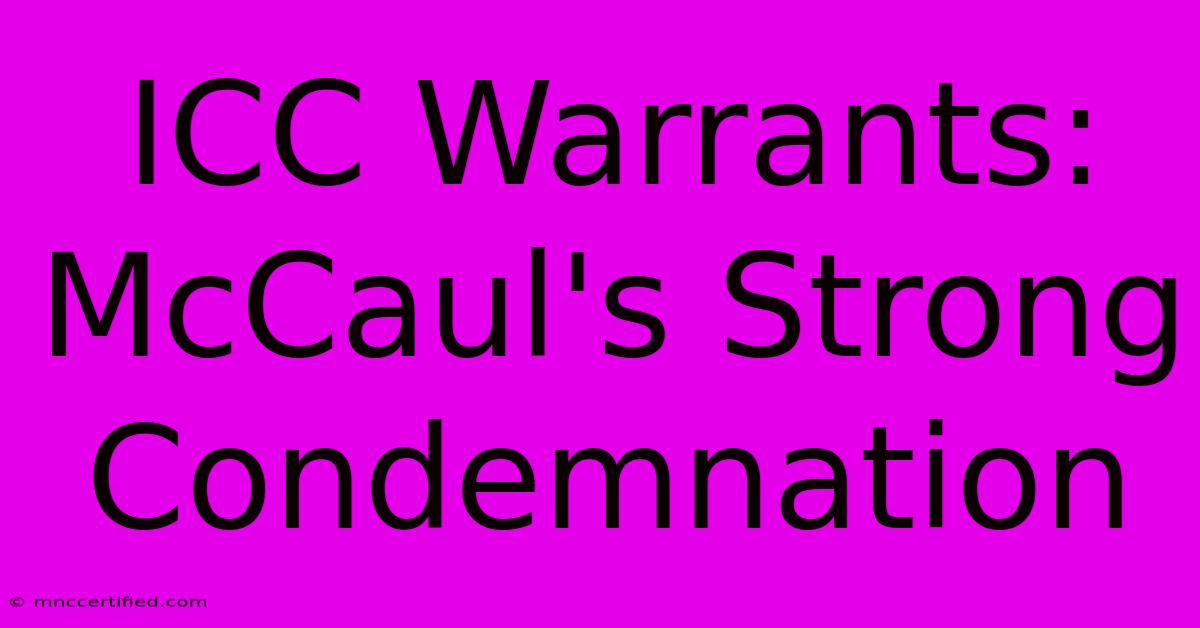ICC Warrants: McCaul's Strong Condemnation

Table of Contents
ICC Warrants: McCaul's Strong Condemnation of Putin
Michael McCaul's vocal opposition to the International Criminal Court (ICC) warrants against Vladimir Putin highlights the escalating geopolitical tensions surrounding the conflict in Ukraine. The issuance of these warrants, accusing Putin of war crimes, has sparked a fierce debate about international law, national sovereignty, and the implications for global security. This article delves into McCaul's strong condemnation, examining the context, the arguments involved, and the potential consequences.
Understanding the ICC Warrants
The International Criminal Court issued arrest warrants for Vladimir Putin and Maria Lvova-Belova, Russia's Commissioner for Children's Rights, alleging the unlawful deportation of Ukrainian children to Russia. This action represents a significant escalation in the international response to the ongoing war in Ukraine. The warrants are based on the Rome Statute, which established the ICC and defines war crimes, crimes against humanity, and genocide. The warrants are legally binding on ICC member states, obligating them to arrest and surrender Putin and Lvova-Belova if they enter their territory.
McCaul's Fierce Criticism
Representative Michael McCaul, Chairman of the House Foreign Affairs Committee, has been a prominent voice criticizing the ICC warrants. He argues that the warrants are a dangerous overreach of the Court's authority and could undermine international stability. McCaul's condemnation is rooted in several key arguments:
Sovereignty Concerns
McCaul, along with other critics, emphasizes the principle of national sovereignty. They argue that the ICC warrants represent an infringement on Russia's sovereignty and could set a dangerous precedent for future interventions in the affairs of other nations. The concern is that such actions could escalate international conflicts rather than resolving them.
Political Motivation
Some critics, including McCaul, suggest that the ICC warrants are politically motivated and intended to further isolate Russia. They question the timing and the selection of charges, arguing that the Court is being used as a tool in the ongoing geopolitical struggle. This perspective highlights concerns about the impartiality and objectivity of the ICC's actions.
Practical Implications
The practical implications of enforcing the warrants are also a point of contention. The likelihood of arresting Putin, given Russia's refusal to cooperate with the ICC, is extremely low. Critics like McCaul argue that the warrants are therefore symbolic rather than practical, potentially exacerbating tensions without achieving tangible results.
The Broader Geopolitical Context
McCaul's condemnation must be viewed within the broader context of the ongoing war in Ukraine and the complex geopolitical landscape. The conflict has already led to significant divisions within the international community, and the ICC warrants further complicate matters. The United States, while not a member of the Rome Statute, has expressed concerns about Russia's actions in Ukraine, but McCaul's strong criticism highlights the delicate balance between supporting international justice and avoiding actions that could further escalate the conflict.
Conclusion: A Complex and Evolving Situation
The ICC warrants against Vladimir Putin represent a significant development in the conflict in Ukraine, sparking a heated debate about international law, sovereignty, and the limits of international justice. McCaul's strong condemnation, fueled by concerns about sovereignty, political motivations, and practical implications, reflects a significant perspective within the United States government. The long-term consequences of these warrants and the resulting geopolitical tensions remain to be seen, underscoring the complexity and evolving nature of this crucial international issue. Further developments will be crucial in shaping the future trajectory of this significant legal and political challenge.
Keywords: ICC warrants, Vladimir Putin, Michael McCaul, International Criminal Court, war crimes, Ukraine, Russia, national sovereignty, geopolitical tensions, international law, Rome Statute, House Foreign Affairs Committee, war in Ukraine, Maria Lvova-Belova, international justice.

Thank you for visiting our website wich cover about ICC Warrants: McCaul's Strong Condemnation. We hope the information provided has been useful to you. Feel free to contact us if you have any questions or need further assistance. See you next time and dont miss to bookmark.
Featured Posts
-
Snowflake Stock Reacts To Positive Earnings
Nov 22, 2024
-
Laws Star Wars A 1977 Reminder
Nov 22, 2024
-
Snowflake Stock Jumps Revenue Beats Estimates
Nov 22, 2024
-
Ken Reid Journalism Giant Passes
Nov 22, 2024
-
Uk Methanol Deaths Rise To Five
Nov 22, 2024